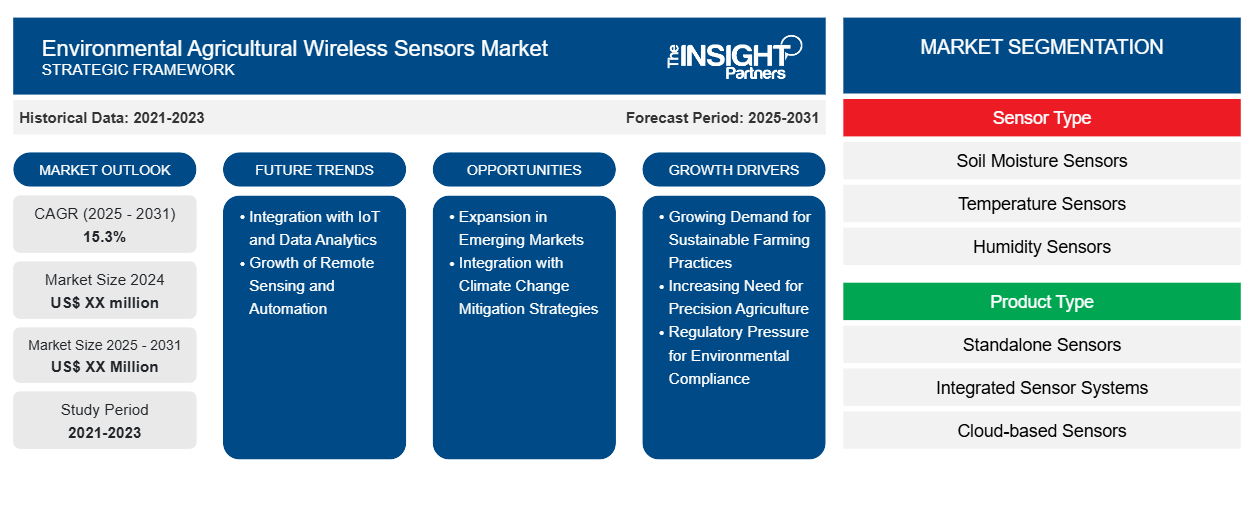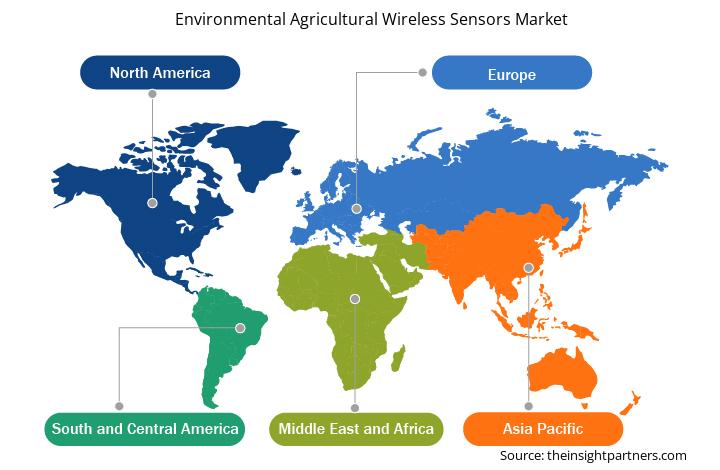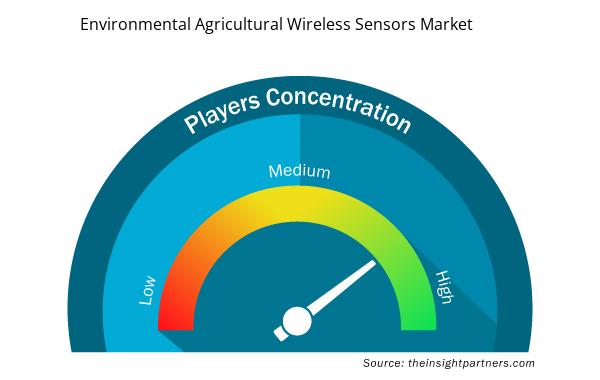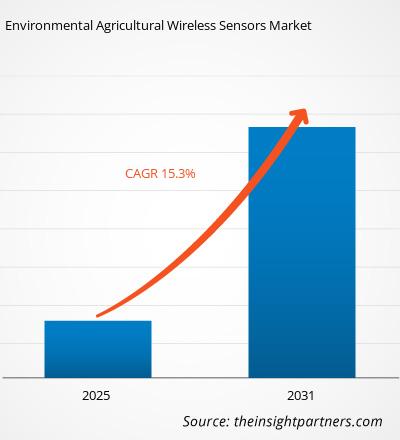The Environmental Agricultural Wireless Sensors Market is expected to register a CAGR of 15.3% from 2025 to 2031, with a market size expanding from US$ XX million in 2024 to US$ XX Million by 2031.
The report is segmented by Sensor Type (Soil Moisture Sensors, Temperature Sensors, Humidity Sensors, Nutrient Sensors), By Product Type (Standalone Sensors, Integrated Sensor Systems, Cloud-based Sensors), By Application (Precision Farming, Soil Health Monitoring, Crop Monitoring, Weather Forecasting), By End Use (Agricultural Producers, Agricultural Services, Research Institutions). The global analysis is further broken-down at regional level and major countries. The Report Offers the Value in USD for the above analysis and segments.
Purpose of the Report
The report Environmental Agricultural Wireless Sensors Market by The Insight Partners aims to describe the present landscape and future growth, top driving factors, challenges, and opportunities. This will provide insights to various business stakeholders, such as:
- Technology Providers/Manufacturers: To understand the evolving market dynamics and know the potential growth opportunities, enabling them to make informed strategic decisions.
- Investors: To conduct a comprehensive trend analysis regarding the market growth rate, market financial projections, and opportunities that exist across the value chain.
- Regulatory bodies: To regulate policies and police activities in the market with the aim of minimizing abuse, preserving investor trust and confidence, and upholding the integrity and stability of the market.
Environmental Agricultural Wireless Sensors Market Segmentation
Sensor Type
- Soil Moisture Sensors
- Temperature Sensors
- Humidity Sensors
- Nutrient Sensors
Product Type
- Standalone Sensors
- Integrated Sensor Systems
- Cloud-based Sensors
Application
- Precision Farming
- Soil Health Monitoring
- Crop Monitoring
- Weather Forecasting
End Use
- Agricultural Producers
- Agricultural Services
- Research Institutions
Customize This Report To Suit Your Requirement
You will get customization on any report - free of charge - including parts of this report, or country-level analysis, Excel Data pack, as well as avail great offers and discounts for start-ups & universities
Environmental Agricultural Wireless Sensors Market: Strategic Insights

- Get Top Key Market Trends of this report.This FREE sample will include data analysis, ranging from market trends to estimates and forecasts.
Environmental Agricultural Wireless Sensors Market Growth Drivers
- Growing Demand for Sustainable Farming Practices: As the agricultural sector shifts toward more sustainable practices, wireless sensors are becoming essential tools for optimizing resource use, such as water, fertilizers, and pesticides. These sensors help monitor environmental conditions in real-time, allowing farmers to reduce waste and improve overall sustainability.
- Increasing Need for Precision Agriculture: With the rise of precision agriculture, wireless sensors play a pivotal role in enhancing crop monitoring and management. These sensors provide data on soil moisture, temperature, nutrient levels, and more, enabling farmers to make more informed decisions for improving crop yields while minimizing environmental impact.
- Regulatory Pressure for Environmental Compliance: Stricter environmental regulations and sustainability goals are driving the adoption of wireless sensors in agriculture. These sensors help farmers monitor and comply with environmental standards, including water usage, soil health, and emissions control, ensuring better environmental management and reducing the risk of fines or penalties.
Environmental Agricultural Wireless Sensors Market Future Trends
- Integration with IoT and Data Analytics: The trend of integrating wireless sensors with IoT (Internet of Things) and advanced data analytics is transforming agriculture. By collecting and analyzing data in real-time, farmers can optimize irrigation, predict crop diseases, and assess soil health, enabling more efficient and productive farming practices.
- Growth of Remote Sensing and Automation: Remote sensing technologies, including drones and satellite-based monitoring, are being combined with wireless sensors to gather detailed environmental data. This trend is enabling automated agricultural systems for real-time monitoring of large farming areas, reducing labor costs and improving operational efficiency.
Environmental Agricultural Wireless Sensors Market Opportunities
- Expansion in Emerging Markets: The demand for environmental agricultural wireless sensors is growing in emerging markets where the agricultural sector is adopting modern technologies. Countries in regions like Asia-Pacific, Africa, and Latin America are investing in precision farming to increase productivity, improve sustainability, and reduce environmental impact, creating opportunities for sensor-based solutions.
- Integration with Climate Change Mitigation Strategies: With increasing concerns about climate change, there is a growing opportunity to use wireless sensors to monitor environmental parameters that affect farming, such as soil moisture, air quality, and temperature fluctuations. These sensors help farmers adjust their practices to mitigate climate risks and adapt to changing weather conditions, offering significant potential for growth in climate-smart agriculture.
Environmental Agricultural Wireless Sensors Market Regional Insights
The regional trends and factors influencing the Environmental Agricultural Wireless Sensors Market throughout the forecast period have been thoroughly explained by the analysts at Insight Partners. This section also discusses Environmental Agricultural Wireless Sensors Market segments and geography across North America, Europe, Asia Pacific, Middle East and Africa, and South and Central America.

- Get the Regional Specific Data for Environmental Agricultural Wireless Sensors Market
Environmental Agricultural Wireless Sensors Market Report Scope
| Report Attribute | Details |
|---|---|
| Market size in 2024 | US$ XX million |
| Market Size by 2031 | US$ XX Million |
| Global CAGR (2025 - 2031) | 15.3% |
| Historical Data | 2021-2023 |
| Forecast period | 2025-2031 |
| Segments Covered |
By Sensor Type
|
| Regions and Countries Covered | North America
|
| Market leaders and key company profiles |
Environmental Agricultural Wireless Sensors Market Players Density: Understanding Its Impact on Business Dynamics
The Environmental Agricultural Wireless Sensors Market market is growing rapidly, driven by increasing end-user demand due to factors such as evolving consumer preferences, technological advancements, and greater awareness of the product's benefits. As demand rises, businesses are expanding their offerings, innovating to meet consumer needs, and capitalizing on emerging trends, which further fuels market growth.
Market players density refers to the distribution of firms or companies operating within a particular market or industry. It indicates how many competitors (market players) are present in a given market space relative to its size or total market value.
Major Companies operating in the Environmental Agricultural Wireless Sensors Market are:
- Decagon Devices
- Libelium
- Teralytic
- Farmobile
- Bosch
Disclaimer: The companies listed above are not ranked in any particular order.

- Get the Environmental Agricultural Wireless Sensors Market top key players overview
Key Selling Points
- Comprehensive Coverage: The report comprehensively covers the analysis of products, services, types, and end users of the Environmental Agricultural Wireless Sensors Market, providing a holistic landscape.
- Expert Analysis: The report is compiled based on the in-depth understanding of industry experts and analysts.
- Up-to-date Information: The report assures business relevance due to its coverage of recent information and data trends.
- Customization Options: This report can be customized to cater to specific client requirements and suit the business strategies aptly.
The research report on the Environmental Agricultural Wireless Sensors Market can, therefore, help spearhead the trail of decoding and understanding the industry scenario and growth prospects. Although there can be a few valid concerns, the overall benefits of this report tend to outweigh the disadvantages.
- Historical Analysis (2 Years), Base Year, Forecast (7 Years) with CAGR
- PEST and SWOT Analysis
- Market Size Value / Volume - Global, Regional, Country
- Industry and Competitive Landscape
- Excel Dataset


- Trade Promotion Management Software Market
- Hydrocephalus Shunts Market
- Artificial Intelligence in Healthcare Diagnosis Market
- Gas Engine Market
- Nurse Call Systems Market
- Analog-to-Digital Converter Market
- Electronic Toll Collection System Market
- Small Internal Combustion Engine Market
- Europe Industrial Chillers Market
- Procedure Trays Market

Report Coverage
Revenue forecast, Company Analysis, Industry landscape, Growth factors, and Trends

Segment Covered
This text is related
to segments covered.

Regional Scope
North America, Europe, Asia Pacific, Middle East & Africa, South & Central America

Country Scope
This text is related
to country scope.
Frequently Asked Questions
Some of the customization options available based on the request are an additional 3–5 company profiles and country-specific analysis of 3–5 countries of your choice. Customizations are to be requested/discussed before making final order confirmation# as our team would review the same and check the feasibility
Key players in the environmental agricultural wireless sensors market include Decagon Devices, Libelium, Teralytic, Farmobile, Bosch, AgSense, Sensaphone, SyncroFarm, Dalian Optronics, and CropX.
Integration with IoT and Data Analytics is likely to remain a key trend in the market.
The major factors driving the environmental agricultural wireless sensors market are:
1. Growing Demand for Sustainable Farming Practices.
2.Increasing Need for Precision Agriculture
The environmental agricultural wireless sensors market is estimated to witness a CAGR of 15.3% from 2024 to 2031

 Get Free Sample For
Get Free Sample For